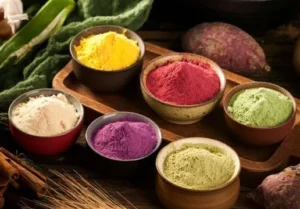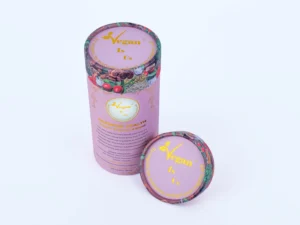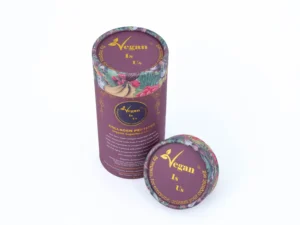Last updated on January 14th, 2025
Winter is a season of cosy evenings, warm beverages, and festive gatherings, but it also brings shorter days and colder weather, which can limit our exposure to sunlight. For many, this reduction in sunlight can make it harder for the body to produce enough Vitamin D. As a plant-based eater, ensuring you get sufficient Vitamin D during the winter months may seem challenging, but it doesn’t have to be. In this blog, we’ll explore the different types of Vitamin D, its benefits, and the best plant-based sources to help you stay healthy this winter. Whether you’re a seasoned vegan or just starting your plant-based journey, these tips will support your wellness during the colder months.
Understanding Vitamin D and Its Importance
Vitamin D, often called the “sunshine vitamin,” is essential for overall health. It’s a fat-soluble vitamin that helps the body absorb calcium and phosphorus, which are critical for bone health. Beyond bone support, Vitamin D is also vital for immune function, mood regulation, and even cardiovascular health.
Types of Vitamin D
There are two primary forms of Vitamin D:
- Vitamin D2 (Ergocalciferol):
- Found in plant-based sources, such as certain mushrooms and fortified foods.
- Less effective than D3 at raising blood levels of Vitamin D, but still beneficial.
- Vitamin D3 (Cholecalciferol):
- Typically derived from animal sources, like fish oil and lanolin (sheep’s wool). However, vegan-friendly D3 is now available from lichen, a type of algae.
While Vitamin D3 is more effective in maintaining adequate levels, combining fortified D2 foods with a vegan D3 supplement ensures sufficient intake for those on a plant-based diet.
The Benefits of Vitamin D
1. Supports Bone Health
Vitamin D helps the body absorb calcium, which is essential for strong bones and support healthy joint. This is particularly important during the winter months when sunlight exposure is limited, and our body struggles to produce Vitamin D naturally.
2. Boosts Immune Function
Winter is often accompanied by an increase in colds and flu. Vitamin D plays a crucial role in supporting the immune system and reducing the risk of infections, helping you stay healthy even during the busiest seasons.
3. Enhances Mood and Mental Health
Seasonal Affective Disorder (SAD) is common during winter, but Vitamin D can help by regulating serotonin production in the brain, which in turn supports a positive mood. Maintaining adequate Vitamin D levels can help stave off those winter blues.
4. Promotes Heart Health
Emerging research suggests that Vitamin D may play a role in lowering the risk of cardiovascular diseases by improving blood pressure and reducing inflammation.
5. Supports Muscle Function
Vitamin D is crucial for muscle strength. A deficiency can lead to muscle weakness, so ensuring you get enough helps maintain physical performance, even during winter when we’re more likely to be sedentary.
Plant-Based Vitamin D Sources
While animal products are typically associated with Vitamin D, there are several plant-based options that can help you meet your daily needs:
1. Fortified Plant-Based Milk
Many plant-based milks, such as almond, soy, oat, and coconut milk, are fortified with Vitamin D, making them an excellent alternative to dairy milk and providing both taste and nutrition.
2. Mushrooms
Certain mushrooms, like shiitake, maitake, and button mushrooms, are rich in Vitamin D. When exposed to sunlight or UV light during growth, these mushrooms can provide significant amounts of Vitamin D2.
- Tip: Look for UV-exposed mushrooms at your local grocery store to maximise Vitamin D content.
3. Fortified Foods
Many breakfast cereals, orange juice, and tofu are fortified with Vitamin D. Be sure to check the labels for vegan-friendly options that align with your dietary preferences.
4. Fruits and Vegetables
Although most fruits and vegetables don’t contain Vitamin D directly, certain options like avocados and leafy greens like kale and spinach can support Vitamin D metabolism in the body, especially when paired with fortified foods.
5. Seeds and Herbs
While seeds like sunflower seeds and herbs like parsley and alfalfa don’t provide large amounts of Vitamin D, they may help with absorption and overall nutrient intake.
6. Vegan Vitamin D Supplements
For those struggling to meet their Vitamin D needs through diet alone, vegan D3 supplements derived from lichen are a reliable option. These supplements are easy to incorporate into your daily routine and ensure that you stay healthy year-round.
How Much Vitamin D Do You Need?
The recommended daily intake for Vitamin D varies depending on age and lifestyle. Most adults need around 10-20 micrograms (400-800 IU) per day, though those with limited sun exposure may need more. Consulting with a healthcare professional can help you determine the right amount for your individual needs.
Tips for Staying Healthy This Winter on a Plant-Based Diet
1. Prioritise Whole Foods
Nutrient-dense whole foods like leafy greens, legumes, nuts, seeds, and whole grains provide essential vitamins and minerals to support overall health. These foods should form the foundation of your winter wellness plan.
2. Include Fortified Foods Regularly
Fortified plant-based milks, cereals, and juices are convenient sources of Vitamin D and other essential nutrients like calcium and B12. Incorporate these into your daily meals for optimal health.
3. Take a Vegan-Friendly Supplement
If you’re concerned about meeting your Vitamin D needs, consider a high-quality vegan D3 supplement. It’s especially helpful during winter months when sunlight exposure is minimal.
4. Stay Active
Exercise boosts your immune system and improves mood. Outdoor walks during daylight hours can help maximise your natural Vitamin D production, while indoor workouts keep you moving and healthy.
5. Hydrate and Rest
Staying hydrated and getting enough rest are crucial for overall wellness. Proper hydration supports digestion, and quality sleep helps your body recover and stay balanced.
Common Myths About Vitamin D and Vegan Diets
- Myth: Plant-based eaters can’t get enough Vitamin D.
Reality: With fortified foods, UV-exposed mushrooms, and vegan supplements, it’s entirely possible to meet your Vitamin D needs on a plant-based diet. - Myth: Sunlight is enough to prevent deficiency.
Reality: In winter, shorter days and reduced UV levels mean that most people need dietary sources or supplements to maintain adequate levels of Vitamin D. - Myth: Vitamin D supplements are not vegan-friendly.
Reality: Vegan D3 supplements derived from lichen provide a plant-based solution for optimal Vitamin D levels.
Why Stay Tuned to Our Blog?
At Vegan Is Us, we are committed to supporting your plant-based journey with helpful guides, wellness tips, and practical advice. Whether you’re looking for nutrient-rich recipes or wellness advice, our blog is here to help you thrive on a plant-based diet every season. Stay tuned for more tips on living a vibrant, healthy life!
Winter doesn’t have to mean low energy or weakened immunity. By making informed choices about your diet and staying active, you can keep your Vitamin D levels in check and feel your best throughout the season. Explore our other posts for more plant-based nutrition tips, and let’s make this winter one of vitality and wellness!







